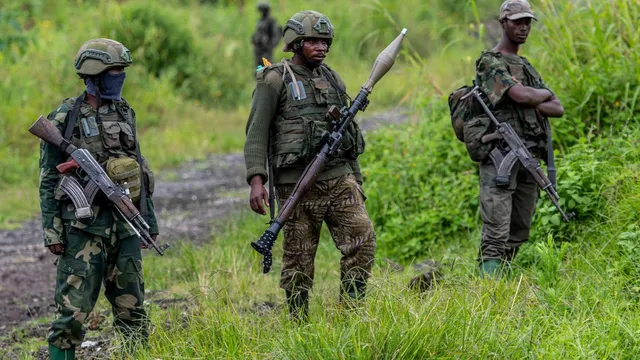
Congo cuts ties with Rwanda amid escalating conflict in eastern city of Goma
2025-01-30 16:25- Congo severed diplomatic ties with Rwanda as M23 rebels gained ground near Goma.
- Heavy fighting has resulted in the deaths of at least 13 peacekeepers and foreign soldiers.
- The international community is being urged to engage in addressing the conflict and its humanitarian implications.
Express your sentiment!
Insights
Congo has severed its diplomatic relationship with Rwanda as fighting intensified around Goma, a key city in eastern Congo on January 27, 2025. The conflict is largely fueled by the M23 rebel group, which is allegedly backed by Rwanda and has been gaining control in the region. As a result, thousands of civilians have been displaced, seeking refuge due to violent clashes, which have left several peacekeepers and foreign soldiers dead. Since breaking away from the Congolese army more than a decade ago, the M23 group, primarily composed of ethnic Tutsis, has sought to establish authority in the mineral-rich area. Both Congo's government and foreign defense forces, including Rwandan troops, have actively engaged against the M23 to maintain peace and security in the region. Last year, Rwanda acknowledged deploying troops and missile systems in eastern Congo to ensure its national security amidst a perceived threat from Congolese forces amassing near the border. As fighting escalated, the U.N. Security Council held an emergency meeting to address the situation, while Congo's government urged the international community to take a stance against Rwanda's alleged support for the M23 rebels. The emergence of such violence bears grave consequences, with reports of mass panic among Goma’s population of two million people, some fleeing from nearby camps amid heavy gunfire. These developments have created chaos and uncertainty, leading to increased humanitarian needs in a region already grappling with a severe humanitarian crisis. The acknowledgment from external governments about the situation has led to heightened tensions, particularly with recent deaths of peacekeepers within the last 48 hours. These events have prompted international calls for a ceasefire and urged Rwanda to withdraw its support for M23. Failure to stabilize the conflict threatens to exacerbate the humanitarian crisis further and could lead to a larger regional crisis, given the volatile relationship between Congo and Rwanda fueled by historical disputes and ongoing armed group activities in the area.
Contexts
The history of the Congo-Rwanda conflict is a complex narrative marked by ethnic tensions, colonial legacies, and regional power dynamics. The roots of the conflict can be traced back to the colonial era when Belgian authorities exacerbated ethnic divisions between the Hutu and Tutsi populations in Rwanda. This division laid the foundation for future violence, culminating in the 1994 Rwandan Genocide where an estimated 800,000 Tutsis and moderate Hutus were killed over a span of 100 days. The aftermath of the genocide saw millions of Rwandans fleeing to neighboring countries, particularly the Democratic Republic of the Congo (DRC), which became a haven for genocide survivors and also the Hutu perpetrators who had participated in the killings. This exodus created a precarious situation in the DRC, necessitating a response from the newly-installed Rwandan government led by the Tutsi-dominated Rwandan Patriotic Front (RPF). In response to the refugee crisis and the threat perceived from Hutu militants who continued to operate from the DRC, Rwanda initiated military interventions in the DRC from 1996 onwards. The First Congo War (1996-1997) led to the ousting of long-time dictator Mobutu Sese Seko and the installation of Laurent-Désiré Kabila as the new leader. However, Kabila's reluctance to grant Rwanda significant influence over Congolese affairs led to rising tensions, culminating in the Second Congo War (1998-2003). This conflict not only involved Rwanda but also other regional powers, ensuring that what began as a dispute between two nations transformed into what became known as 'Africa's World War' involving multiple countries and resulting in millions of deaths, primarily due to violence, starvation, and disease. The aftermath of the Second Congo War left the DRC in a state of fragility, with persistent violence from various armed groups, many of whom were remnants of Hutu militias or local militias fighting for control over territory and resources. Rwanda's continued military involvement in the DRC, often justified under the pretext of national security against Hutu insurgents, has perpetuated a cycle of violence and instability. Additionally, the natural wealth of the DRC, including precious minerals like coltan and diamonds, has fueled conflicts and attracted external interests that further complicate the situation. Efforts for peace have been made through various accords, notably the Sun City Agreement and the Pretoria Accord, but these have often faltered due to lack of commitment from the involved parties and ongoing grievances among various factions. Today, although the active states of war may have subsided, the Congo-Rwanda conflict has left deep scars in both societies and remains a poignant reminder of the complexities of African politics and the interconnections between historical grievances and contemporary conflicts. While regional organizations like the African Union and collaborative efforts for peace and reconciliation continue, the task remains daunting, requiring significant political will and support to rebuild trust among communities torn apart by decades of violence.